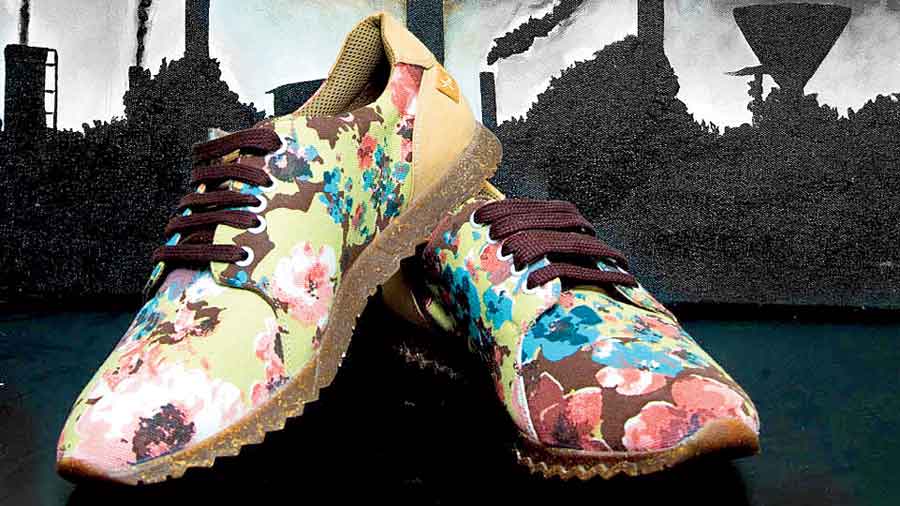Introduction to Vegan Footwear
In recent years, vegan footwear has surged in popularity as consumers become more aware of their fashion choices’ environmental and ethical implications. Vegan women’s shoes, made without any animal products, are a cruelty-free alternative that aligns with the principles of sustainable fashion. More than just a fad, this move toward vegan products is a deliberate attempt to lessen our environmental impact and encourage a more morally conscious attitude toward clothing. Individuals say they value the planet and animal welfare by choosing vegan footwear.
Environmental Impact of Traditional Leather
Traditional leather production has a significant environmental footprint. The process involves:
- Raising animals.
- Contributing to deforestation and methane emissions.
- Using chemicals in tanning that pollute waterways.
Reports indicate that the leather industry accounts for around 14.5% of global greenhouse gas emissions. Furthermore, habitat degradation and a decrease in biodiversity are caused by the deforestation linked to cattle rearing. The chemicals used in the tanning process can seep into soil and water sources, causing long-term environmental damage. Buying vegan footwear can help people drastically reduce their carbon footprint and make the world healthier. Vegan materials often have a fraction of the environmental impact compared to traditional leather, making them a more sustainable choice from production to end of life.
Ethical Considerations
The emphasis on cruelty-free products has increased due to the growth in ethical consumption. Vegan footwear eliminates the need for animal exploitation, which resonates with those who prioritize animal welfare. This shift towards ethical fashion supports a more humane approach to fashion by ensuring that no animals are harmed in the production process. Many consumers are increasingly aware of the conditions in which animals are bred and slaughtered for leather, and they are choosing vegan options as a way to protest against these inhumane practices. By purchasing vegan footwear, you also endorse companies that use eco-friendly materials and minimize waste, among other ethical business practices and fair labor policies.
Innovative Materials in Vegan Footwear
Innovative, environmentally friendly leather substitutes have been created thanks to developments in materials science. There are currently shoes made from cork, pineapple fibers, and recycled plastic. Shoes made from recycled plastics, cork, and pineapple fibers are now available. These materials are an appealing option for contemporary customers wishing to lessen their environmental effects without sacrificing style or quality since they decrease environmental impact, offer distinctive aesthetics, and are durable. For instance, recycled plastics help reduce the amount of waste in the oceans, while cork is a renewable resource harvested without harming trees. Pineapple fiber, known as Piñatex, is a byproduct of the pineapple industry that gives a second life to agricultural waste. There are many possibilities for individuals who want to make a sustainable fashion statement because these materials are being utilized increasingly to manufacture everything from stylish boots to sleek shoes.
Examples of Sustainable Materials
- Recycled Plastics: Utilizing plastics in the ocean and post-consumer garbage contributes to environmental cleanup and lessens the need to create virgin plastic.
- Cork: Harvested without harming trees and known for its renewable properties, cork is lightweight, durable, and provides excellent cushioning.
- Pineapple Fibers: Derived from pineapple leaves, offering a biodegradable and robust alternative to leather that also supports agricultural communities.
Comfort and Style
One common misconception about vegan footwear is that it sacrifices style and comfort. However, many brands have yet to be able to produce fashionable and comfortable designs. Whether looking for casual sneakers, elegant flats, or sturdy boots, a vegan option suits your needs. Brands are increasingly focused on integrating ergonomic designs with superior materials, ensuring that vegan shoes meet high standards of comfort and aesthetics. Modern vegan materials can mimic the softness and durability of leather, providing the same level of comfort and support without the ethical and environmental downsides. Additionally, many vegan footwear brands are led by innovative designers who prioritize form and function, ensuring customers do not have to choose between style and ethics.
Supporting Sustainable Practices
Choosing vegan footwear is a step towards supporting sustainable fashion practices. With the fashion industry being one of the largest polluters globally, switching to ethical and sustainable options like vegan shoes can significantly impact the industry. The more consumers demand these products, the more brands incorporate sustainable practices into their production lines. This collective shift can drive systemic changes within the industry, fostering a culture of responsibility and innovation. By supporting companies prioritizing sustainability, consumers can help create a market where eco-friendly practices are the norm rather than the exception. This shift benefits the environment and encourages brands to invest in more sustainable technologies and materials, driving further progress in the industry.
How to Start Your Vegan Footwear Journey
Research brands that specialize in vegan footwear and are committed to sustainability. Look for certifications and labels that indicate products are vegan and ethically made, such as the PETA-Approved Vegan label. Consider the materials used and choose sturdy, environmentally friendly options to ensure a longer lifespan and less waste. Encourage businesses to provide transparent information about their supplier chains, environmental policies, and production methods.
Gradually transition your footwear collection by prioritizing replacing worn-out items with vegan alternatives, allowing for a sustainable and budget-friendly switch.
Conclusion: Embracing a Sustainable Future
Transitioning to vegan footwear is not just a trend but a meaningful change reflecting a commitment to sustainability and ethical consumption. By selecting goods that are manufactured without inflicting damage on animals or the environment, consumers can contribute to a more sustainable fashion sector. This conscious choice helps reduce the demand for animal-based products and encourages brands to adopt more sustainable practices.
Stay in touch to get more updates & news on Adviser Master!



